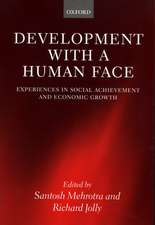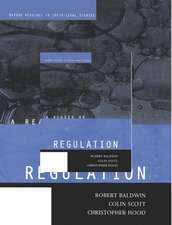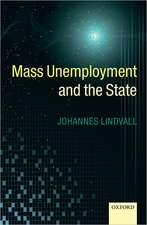Austerity: The History of a Dangerous Idea
Autor Mark Blythen Limba Engleză Paperback – 26 feb 2015
Preț: 75.69 lei
Preț vechi: 89.54 lei
-15% Nou
Puncte Express: 114
Preț estimativ în valută:
14.48€ • 15.04$ • 12.08£
14.48€ • 15.04$ • 12.08£
Carte disponibilă
Livrare economică 20-26 februarie
Livrare express 14-20 februarie pentru 38.80 lei
Preluare comenzi: 021 569.72.76
Specificații
ISBN-13: 9780199389445
ISBN-10: 0199389446
Pagini: 336
Dimensiuni: 224 x 135 x 20 mm
Greutate: 0.43 kg
Editura: Oxford University Press
Colecția OUP USA
Locul publicării:New York, United States
ISBN-10: 0199389446
Pagini: 336
Dimensiuni: 224 x 135 x 20 mm
Greutate: 0.43 kg
Editura: Oxford University Press
Colecția OUP USA
Locul publicării:New York, United States
Recenzii
excellent... timely... illuminating
A must-read
One of the especially good things in Mark Blyth's Austerity: The History of a Dangerous Idea is the way he traces the rise and fall of the idea of 'expansionary austerity', the proposition that cutting spending would actually lead to higher output. As Blyth documents, this idea 'spread like wildfire.'
An important polemic... valid and compelling.
Mark Blyth has written a clever, well-argued book that we should all read.
Essential reading... The economy is much too important to leave to economists. We need to understand how ideas shape it, and Blyth's new book provides an excellent starting point.
Splendid new book.
Austerity is an economic policy strategy, but is also an ideology and an approach to economic management freighted with politics. In this book Mark Blyth uncovers these successive strata. In doing so he wields his spade in a way that shows no patience for fools and foolishness.
Of all the zombie ideas that have been reanimated in the wake of the global financial crisis, austerity is the most dangerous. Mark Blyth shows how austerity created the disasters of the 1930s, and contributed to the descent of the world into global war. He shows how European austerity policies have prevented any recovery from the crisis of 2009, while rescuing and protecting the banks and financial institutions that created the crisis. An essential guide for anyone who wants to understand the current depression.
Most fascinating is the author's discussion of the historical underpinnings of austerity, first formulated by Enlightenment thinkers Locke, Hume and Adam Smith, around the (good) idea of parsimony and the (bad) idea of debt. Ultimately, writes Blyth, austerity is a 'zombie economic idea because it has been disproven time and again, but it just keeps coming. A clear explanation of a complicated, and severely flawed, idea.
Informed, passionate.
Mark Blyth's fascinating analysis guides the reader through 'the historical ideology which has classified debt as problematic.' In doing so he outlines the relevance of century-old debates between the advocates and opponents of laissez faire, and explains why, after a brief reemergence in 2008-09, and despite the lack of evidence supporting austerity, the world turned its back on Keynesian policies.
Among all the calamities spawned by the global financial crisis, none was as easily avoidable as the idea that austerity policies were the only way out. In this feisty book, noted political scientist Mark Blyth covers new territory by recounting the intellectual history of this failed idea and how it came to exert a hold on the imagination of economists and politicians. It is an indication of the sorry state of macroeconomics that it takes a political scientist to expose so thoroughly one of the economics profession's most dangerous delusions.
A must-read
One of the especially good things in Mark Blyth's Austerity: The History of a Dangerous Idea is the way he traces the rise and fall of the idea of 'expansionary austerity', the proposition that cutting spending would actually lead to higher output. As Blyth documents, this idea 'spread like wildfire.'
An important polemic... valid and compelling.
Mark Blyth has written a clever, well-argued book that we should all read.
Essential reading... The economy is much too important to leave to economists. We need to understand how ideas shape it, and Blyth's new book provides an excellent starting point.
Splendid new book.
Austerity is an economic policy strategy, but is also an ideology and an approach to economic management freighted with politics. In this book Mark Blyth uncovers these successive strata. In doing so he wields his spade in a way that shows no patience for fools and foolishness.
Of all the zombie ideas that have been reanimated in the wake of the global financial crisis, austerity is the most dangerous. Mark Blyth shows how austerity created the disasters of the 1930s, and contributed to the descent of the world into global war. He shows how European austerity policies have prevented any recovery from the crisis of 2009, while rescuing and protecting the banks and financial institutions that created the crisis. An essential guide for anyone who wants to understand the current depression.
Most fascinating is the author's discussion of the historical underpinnings of austerity, first formulated by Enlightenment thinkers Locke, Hume and Adam Smith, around the (good) idea of parsimony and the (bad) idea of debt. Ultimately, writes Blyth, austerity is a 'zombie economic idea because it has been disproven time and again, but it just keeps coming. A clear explanation of a complicated, and severely flawed, idea.
Informed, passionate.
Mark Blyth's fascinating analysis guides the reader through 'the historical ideology which has classified debt as problematic.' In doing so he outlines the relevance of century-old debates between the advocates and opponents of laissez faire, and explains why, after a brief reemergence in 2008-09, and despite the lack of evidence supporting austerity, the world turned its back on Keynesian policies.
Among all the calamities spawned by the global financial crisis, none was as easily avoidable as the idea that austerity policies were the only way out. In this feisty book, noted political scientist Mark Blyth covers new territory by recounting the intellectual history of this failed idea and how it came to exert a hold on the imagination of economists and politicians. It is an indication of the sorry state of macroeconomics that it takes a political scientist to expose so thoroughly one of the economics profession's most dangerous delusions.
Notă biografică
Mark Blyth is Professor of International Political Economy at Brown University. He is the author of Great Transformations: Economic Ideas and Institutional Change in the Twentieth Century.


















